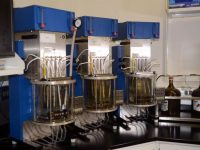When Routine Oil Analysis Isn't Enough, Get Answers With MIA Case Study: Hydrogen Sulfide Gas Compressor A sample of Royal Purple Synfilm NGL 100 from a hydrogen sulfide gas compressor was submitted for Material Identification Analysis (MIA) testing. It was reported that the oil heat exchangers appeared to be clogging which reduces flow and cooling.…
Read more
When Routine Oil Analysis Isn’t Enough, Get Answers With MIA






